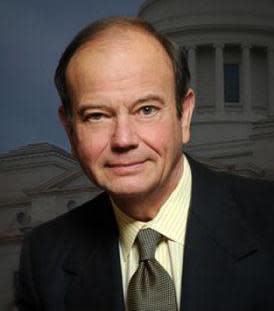Long-term, lingering effects of COVID-19 | Steve Barnes
- Oops!Something went wrong.Please try again later.

“No kidding,” Judith smiled, a pyrrhic smile. She was scanning a printed copy of the statewide daily newspaper, which was reporting a surge in (a) reported cases of COVID-19; (b) hospitalizations from the virus; and (c) the coronavirus death toll in Arkansas, which now has crept past 11,500.
“You expected something different?” she asked, knowing the answer.
No, I didn’t expect anything different, because (a) I know Judith, a skilled health professional who talks to me on condition I don’t use her last name; (b) I know my daughter-in-law, also a clinician, who tells me stuff on background from her hours in the emergency room; (c) because I trust the science, the doctors, the epidemiologists, the researchers; (d) because I know Arkansas is seriously behind the curve in terms of COVID vaccinations; and (e) because I don’t trust cable TV or radio gasbags quoting fringe practitioners, nor politicians preaching – effectively practicing – medicine without a license. I trust even less those politicians who are medically licensed but who scare the daylights out of their wiser, less political colleagues. I trust the one I call the "World’s Greatest Doctor" (WGD), the one who got his MD from the University of Arkansas for Medical Sciences a few decades ago, the one who’s taken care of my family for about that long, and who, still, wears a mask. As does his staff.
“Still” – yes, still. Well into the planet’s third year of COVID-19 and its offshoots, he is still wearing his mask, at least in the office, and I feel certain in church and at the supermarket, and in every other congregate setting he may venture. So are countless other health professionals, including Dr. Ezekiel Emanuel, an oncologist and professor at the University of Pennsylvania’s medical school and a government clinical consultant.
“Many Americans will think me either stupid or foolish” for continuing to mask in public, Emanuel wrote recently. “They will point to recent data suggesting that about 60% of Americans have already contracted omicron or another variant. So, they argue, COVID is endemic. Just accept the inevitable.
“This position reflects a triumph of desire over data. A wealth of evidence shows that COVID-19 is not a mere cold or mild flu. It is a serious infection. Indeed, the belief that omicron was more mild than earlier variants was wrong. It was just as deadly. But we still do not know enough about the complications that come after the initial infection.” (Italics added.)
Long COVID, it’s called – the complications that sometimes, too often, come after that initial infection. And linger for days, weeks, months. Years. Likely forever, some of those aftereffects.
Judith looked up from Emanuel’s article, a copy of which I had showed her.
“Yep,” she said. “We’re only just starting” to understand the implications of long COVID. She said nothing for a moment. “We know it’s bad.”
Bad, as Arkansas doctors with experience dealing with COVID tell us, includes chronic fatigue, muscle aches, shortness of breath, insomnia, persistent imbalance. And recurring headaches, depression and/or anxiety, loss of cognitive function.
Add: “We are just learning about the risk of heart attacks and developing diabetes months or years after infection,” notes Emanuel. “COVID-infected pregnant women faced an increased risk of being hospitalized, being admitted to the intensive care unit and having a preterm delivery.”
The fiscal implications for the private and public sectors, including hospitals from Fort Smith to Forrest City and every town in between, are substantial. Only now are the staffing and supply issues beginning to stabilize, and just as a summer surge of COVID variants is beginning to make itself felt. A further complication: What is known about this virus is that it can produce in some individuals only the very mildest symptoms – a two-day sniffle or a three-day sore throat, a degree or two of fever – only to manifest in far more profound ailments following “recovery.”
In purely financial terms, COVID and its variants already have proved crushingly expensive, into the trillions when federal and state government spending is factored, and the hit on commerce at every level. The hits just keep on coming: Premiums for medical and disability coverage, private and public, are feeling it, and will continue to.
“By behaving as if COVID is behind us, we are creating a serious burden for the future,” Emanuel says.
In the clinical realm, more people will get sick and more will die. So, yes, the WGD and his apolitical counterparts will continue to mask. And, shall we say, won’t object if the rest of us do.
Judith reviewed the articles again and had a suggestion, one based in science and intended to raise Arkansas’ woeful COVID vaccination rate: “Tell men that it can mean erectile dysfunction.”
Steve Barnes is the host of "Arkansas Week" on Arkansas PBS.
This article originally appeared on Fort Smith Times Record: Long-term, lingering effects of COVID-19 | Steve Barnes
